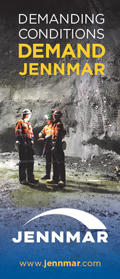Thiess says it has acquired significant stakes in two Australian businesses, LAAMP and Mechatronix, as part of its plans to expand its offering as a global services provider, outside of the traditional mining operations.
Both companies have been working with Thiess for several years to manage and grow two of the mining services provider’s key value drivers: its people and equipment.
LAAMP is a digital platform that delivers streamlined training and assessments to remote workforces, while Mechatronix is pioneering carbon-fibre structural reinforcements to dramatically extend the life of trucks and, ultimately, boost payload capacity, Thiess says.
Thiess Group Executive Chair and CEO, Michael Wright, said: “The investments in LAAMP and Mechatronix will provide wider benefits for our valued clients and people, while helping us reach our goals in sustainability and innovation. LAAMP aims to ensure our people have the right competency and capability, with the latest thinking in training and assessments, while Mechatronix has a global focus on fleet sustainability and asset longevity.”
Thiess first approached Mechatronix, a family-owned business, in 2020, with an ambitious target to double the expected operating life of its existing mining trucks, from about 60,000-70,000 hours (typically about 10 years on-site) to about 110,000-120,000 hours. For Mechatronix founder, Andrew Middlin, it was good timing. An engineer by trade, he had spent 30 years in the mining industry analysing machines for stress and fatigue, before working with an industry-first solution to extend the life of these critical assets.
Around 2014, Middlin realised there was a limit to what could be done with all-metal solutions and pioneered the use of carbon fibre – a material stronger than steel, yet significantly lighter – to reinforce truck chassis and structural components, which are generally not economically repairable after major and repetitive fatigue cracking.
Along with extending asset life, another major focus for Mechatronix is ‘lightweighting’ vehicles by replacing heavy steel structures with hybrid metal-carbon fibre alternatives. This will provide an immediate payload benefit on current assets and will assist the sector with the transition to electric or hydrogen powered machines, offsetting the impact of payload reduction from heavy batteries or fuel cells, Thiess says.
“If we can take 10 t of weight out of an asset – that’s an extra 10 t a truck on a mine site can carry on each load. Overall, that increases productivity, while providing a smarter and more sustainable solution for existing assets,” Middlin said. “It’s a genuine win-win situation where we have a high-profile partner to help us showcase to the industry what we can do, while for Thiess, our technology allows them to be a differentiator in their sector and make strong inroads into their sustainability commitments.”
Thiess is also set to install Mechatronix-designed and built kits to assets of its own, and to those of its clients, at the new Rebuild Centre on Batam Island in Indonesia.
Wright said: “We have one of the largest fleets globally in the mining sector, with about 1,200 off-highway mining trucks, so it makes sense for us to invest in this capability. Our industry is always looking to extend the life of existing assets and transition to electric vehicles. This is a natural partnership.”
The company’s other partnership, with Adelaide-based LAAMP, goes back to 2019, when Thiess was looking at improving its training, assessment and staff records across a disparate global workforce.
“At that time, we had staff spread across Africa, the Americas, Indonesia, Mongolia, India and Australia and the content was being delivered in different ways, without the consistency we would have liked,” Wright said. “We wanted to change not only how the content was delivered – to make it interactive, multilingual and relevant – but also how and where it was delivered.”
For Thiess, the driving principle has always been that improved competency and capability will deliver both a safer workplace, and one that is more productive.
LAAMP founder and Managing Director, Tim Angel, who had started his career in the mining industry in the early 2000s, had seen an unmet need for organisations to centralise and digitise induction, training and assessment. LAAMP not only delivers content to remote work sites, but it also maintains a digital record of training and assessment to maintain a vetted and verified ‘skills passport’ for each person. This allows staff to move more easily between sites and organisations – a point-in-time oversight of their workforce skills base.
Just five years after he established LAAMP, Angel said the company has conducted more than 12 million training events, and it is being used in mining, construction, hospitality and healthcare across Australia, North America, South America, Asia and Africa.
Angel said: “There are benefits for employees, too, as the LAAMP platform allows workers to access and share their own `skills passport’, rather than keeping track of paper certificates and qualifications. The support from our team to make this a global success has been tremendous. In particular, Mark Butcher and Beau Rybajlak have been instrumental in our success to date and will play a pivotal role as we continue to empower the global workforce of the future through LAAMP.”











